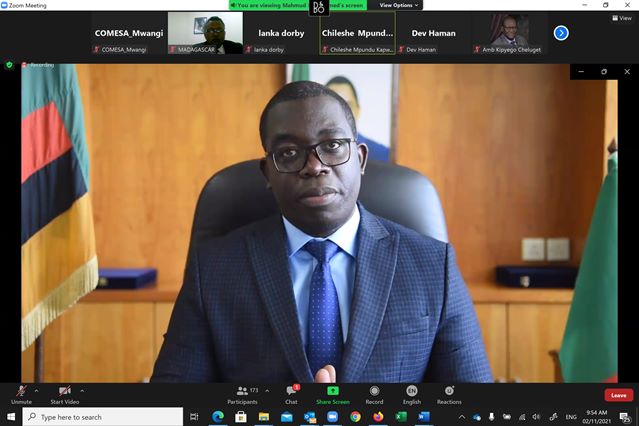
Tuesday, November 02, 2021: A fresh call has been made to COMESA countries to ensure full implementation of the guidelines for the movement of goods and services that was developed last year to facilitate regional trade during the Covid-19 pandemic.
Zambia Minister for Commerce, Trade and Industry Hon Chipoka Mulenga told delegates attending the 42nd COMESA Intergovernmental Committee virtual meeting from 02 – 04 November 2021, that supply chains are still constrained and prices for inputs and consumables are rising in Member States.
“Our countries have now started to experience the negative impact of Covid-19 induced disruptions of supply chains and weakening demand levels in our trading partners as our trade volumes are showing marked declines,” said the Minister.
Speaking at the opening of the meeting, Tuesday, 02 November 2021, the minister noted that the effects of the COVID-19 pandemic are likely to further weaken the performance of the Member States’ external markets and will also have negative impacts on imports into the region affecting availability of supplies which will lead to further increase in prices.
Data from COMESA Statistics indicates that the value of intra-COMESA total exports declined by 11% from US$ 10.9 billion in 2019 to US$ 9.7 billion in 2020. Similarly, the value of COMESA’s total exports to the world decreased by 27% from US$ 123.4 billion in 2019 to US$ 90.3 billion in 2020.
Minister Mulenga urged the 21 Member States to start strategizing on how to maintain the balance between the need to keep markets open while safeguarding the legitimate public health interests of Member States.
“One area where significant progress has been made is automation of cross-border clearance processes, the electronic tracking of movement of drivers and their cargo and the enhanced coordination of operations of border agencies,” he said adding that this has reduced NTB’s at border crossing and contributed to keeping supply chains for essentials goods open.
The Guidelines for the Movement of Goods and Services across the COMESA Region were adopted by the 8th COMESA extraordinary meeting of the Council of Ministers in May 2020, to minimize disruption to cross-border trade in goods and services.
Secretary General of COMESA, Chileshe Kapwepwe, noted that the path to full integration of the region is still marked by obstacles in the movement of people and services. Hence the Secretariat has continued to build capacity of Member States on services negotiations and trade in services statistics.
She said: “Globalization of services provides the opportunity for developing countries and the COMESA region in particular, to find new niches where they can specialize, upscale and achieve rapid growth just as East Asian countries did in manufacturing.”
In her speech, she appealed to Member States to continue the implementation of the guidelines and make use of the Online Platform that was developed last year to ensure availability and seamless flow of goods and services during the Covid-19 pandemic period.
The IC comprises of Permanent/Principal Secretaries responsible for the development of programmes and action plans in all fields of co-operation except in the finance and monetary sector.
The meeting will review progress reports presented by various sectoral committees and COMESA institutions and make recommendations to the Council of Ministers for decision-making.
The Council will meet on 9 – 10 November 2021 followed by the 21st COMESA Heads of State and Government Summit on 23 November 2021 in Egypt, whose theme is: Building Resilience Through Strategic Digital Economic Integration.
Minister’s audio/visual speech:

